|
De Amerikaanse schrijver Bernard Malamud werd op 26 april 1914 in Brooklyn, New York, geboren. Zie ook alle tags voor Bernard Malamud op dit blog.
Uit:The Fixer
“From the small crossed window of his room above the stable in the brickyard, Yakov Bok saw people in their long overcoats running somewhere early that morning, everybody in the same direction. Vey iz mir, he thought uneasily, something bad has happened. The Russians, coming from streets around the cemetery, were hurrying, singly or in groups, in the spring snow in the direction of the caves in the ravine, some running in the middle of the slushy cobblestone streets. Yakov hastily hid the small tin can in which he saved silver rubles, then rushed down to the yard to find out what the excitement was about. He asked Proshko, the foreman, loitering near the smoky brickkilns, but Proshko spat and said nothing.Outside the yard a black-shawled, bony-faced peasant woman, thickly dressed, told him the dead body of a child had been found nearby. "Where?" Yakov asked. "How old a child?" but she said she didn't know and hurried away. The next day the Kievlyanin reported that in a damp cave in a ravine not more than a verst and a half from the brickworks, the body of a murdered Russian boy, Zhenia Golov, twelve years old, had been found by two older boys, both fifteen, Kazimir Selivanov and Ivan Shestinsky. Zhenia, dead more than a week, was covered with stab wounds, his body bled white. After the funeral in the cemetery close by the brick factory, Richter, one of the drivers, brought in a handful of leaflets accusing the Jews of the murder. They had been printed, Yakov saw when he examined one, by the Black Hundreds organizations. Their emblem, the Imperial double-headed eagle, was imprinted on the cover, and under it: SAVE RUSSIA FROM THE JEWS. In his room that night, Yakov, in fascination, read that the boy had been bled to death for religious purposes so that the Jews could collect his blood and deliver it to the synagogue for the making of Passover matzos. Though this was ridiculous he was frightened. He got up, sat down, and got up again. He went to the window, then returned hastily and continued to read the newspaper. He was worried because the brick factory where he worked was in the Lukianovsky District, one in which Jews were forbidden to live. He had been living there for months under an assumed name and without a residence certificate. And he was frightened of the pogrom threatened in the newspaper. His own father had been killed in an incident not more than a year after Yakov's birth--something less than a pogrom, and less than useless: two drunken soldiers, shot the first three Jews in their path, his father had been the second. But the son had lived through a pogrom when he was a schoolboy, a three-day Cossackraid. On the third morning when the houses were still smoldering and he was led, with a half dozen other children, out of a cellar where they had been hiding he saw a black-bearded Jew with a white sausage stuffed into his mouth, lying in the road on a pile of bloody feathers, a peasant's pig devouring his arm.”
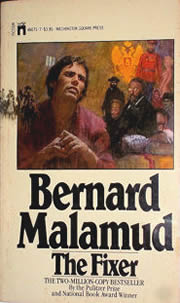
Bernard Malamud (26 april 1914 – 18 maart 1986)
Cover
De Spaanse dichter Vincente Aleixandre (eig. Vicente Pío Marcelino Cirilo Aleixandre y Merlo) werd geboren op 26 april 1898 in Sevilla. Zie ook alle tags voor Vincente Aleixandre op dit blog en eveneens alle tags voor V. Aleixandre.
Hands
Look at your hand that slowly moves,
transparent, tangible, traversed by light,
lovely, vital, all but human in the night.
With the moon's reflection, with the color of a cheek,
with the vagueness of a dream,
look at how it grows as you raise your arm,
in useless quest for a night now lost,
a wing of light in silent crossing
touches carnally that darkened vault.
Your sorrow does not phosphoresce, nor has it caught
that heated palpitation of another flight.
Persecuted, soaring hand: you form a pair.
Tender, dark, extinguished, you traverse the sky.
You are love's callings, the symbols
that in the noiseless dark call to one another.
Sky now tepid and devoid of stars offers its
ample field for all your silent flights.
The hands of lovers who have lately died,
hands with life that soaring seek their mate
and as they collide and embrace, they ignite
above man's head an instantaneous moon.
Kisses
It is you alone, continuous,
of comely grace who give yourself
and call to me today. Accept, accept
the warmth, the happiness,
the closed and cloudy dark of mouths
tight-sealed. In gentle manner
we have lived. Die, surrender.
Nothing more than kisses reign:
a waning, tepid yellow sun
that smiling, fragile, delicate,
here in the happy mouths expires,
between the stormy clouds that break,
between the radiant, joyous blues
where kisses shine, the evening's
glad delights, the dazzling summit
of this eccentric setting sun,
so very quiet now, that pulses
in the west and dies. —Die, absorb
life's fullness. —Kiss me! —Thee I kiss.
Oh glowing world thus touched with gold!
Vertaald door Hugh H. Harter
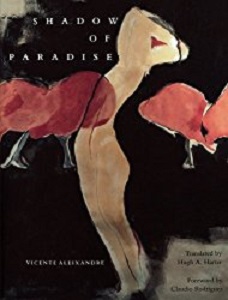
Vicente Aleixandre (26 april 1898 – 14 december 1984)
Cover
De Duitse dichter en schrijver Carl-Christian Elze werd geboren op 26 april 1974 in Berlijn. Zie ook alle tags voor Carl-Christian Elze op dit blog.
vater war
die grammatik bleibt
immer im fluss die verben
präsens muss man sich abgewöhnen
für ein gespräch unter waisen die nomen
possessivpronomen: sein auto seine frau sein hund
sein bett leben fort unverändert in allen
deklinationen konjunktiv gehäuft
tut weh: er wäre gern noch
hätte gern noch
würde
ich bin heut aufgewacht & war lebendig, einfach so.
bin nicht gestorben über nacht, bin noch ganz so
wie gestern spät, als ich das licht mit einem fingerdruck
auslöschte. weil ich so müd war & die augen fielen
wie zwei soldaten reglos ins gebüsch –
& bin doch aufgewacht, ein häufchen licht
das durch die zweige fiel & auf die umgestürzten beine.
alle zeilen wurden sanft erschreckt & durchgezählt
& ausgestreckt. jetzt steigt die herrschaft aus dem bett
wie kleine wolken. schwebt schritt vor schritt – fast mühelos.
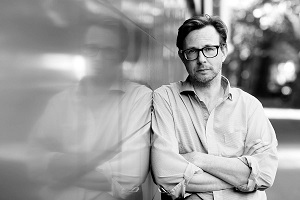
Carl-Christian Elze (Berlijn, 26 april 1974)
De Duitse dichteres en schrijfster Hannelies Taschau werd geboren op 26 april 1937 in Hamburg. Zie ook alle tags voor Hannelies Taschau op dit blog.
Parabel
Im März 1945 – ich war sieben – entkam ich der
Obhut meiner Großmutter
Ich sprang in die Donau an einer Stelle von
der ich glaubte sie sei grundlos
Ich begann zu ertrinken
und wehrte mich
Man zog mich heraus und prügelte Wasser
und Schlamm aus mir
Drei Wochen hütete ich voll Sanftmut das Bett
ohne Anzeichen irgendeiner Krankheit
dann lernte ich schwimmen an derselben
Stelle
Männerkind
Sein Köpfchen aus Lissabon die Hüften
und Beine aus Salford aus Pisa die Finger
Krabbelt Reagiert auf alles was sich bewegt
betatscht bunte Klötze und schlägt
sich auch mal die Kniemechanik auf
Kontrolliert selbstständig seinen Akku
kann sein Gleichgewicht halten hat
Sensoren einen Temperaturfühler
und ein paar gängige Reflexe
ständig wird die Software verbessert
alles wird protokolliert: Macht der Kleine
Fortschritte wird er bockig regt ich künstliche
Intelligenz im kalten Köpfchen.
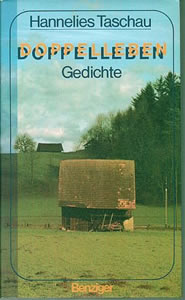
Hannelies Taschau (Hamburg, 26 april 1937)
Cover
De Nederlandse dichter en schrijver Theun de Vries werd geboren in Veenwouden op 26 april 1907. Zie ook alle tags voor Theun de Vries op dit blog.
De galeislaven zingen
Goden, die wonen waar nachtwind en sterren den hemel verheugen,
goden, wij dragen de dagen gelijk onze ketens, de zware;
eendere riemslag van knechtschap op eendere maat van verneedring
drijft ons den dood tegemoet, en de hoop op zijn kus van bevrijding.
Eens verbreken de ketens en onze leeflooze lijven
dalen in donkere zee, en de storm zingt een bandeloos lijklied,
totdat de vloeden hen spoeden naar eeuwige Okéanos grensloos.
Doch onze zielen vleugen vrijuit en landen als vogels,
goden, bij U, waar nachtwind en sterren den hemel verheugen.
Proteus
Ach, in hoeveel vluchtgestalten
ben ik niet mijzelf ontstegen,
ach, mijn leven heeft een al te
zeekre veiligheid verkregen. -
Waar mijn vorm zich voor laat doorgaan
- water, vlam of rozenheester -
nooit bereik ik een teloorgaan,
word ik mijn begrensdheid meester;
kan wel vlam, maar nimmer rook zijn
en mijzelf voorgoed verliezen,
kan wel water, nimmer wolk zijn
en het onbegrensde kiezen.
Opgejaagd en achterdochtig
bij een windvlaag of een schaduw,
vreezend als een wiekslag vluchtig
langs mij scheert, een snelle zwaluw,
kan ik mij niet meer bezinnen
wat gedaanten 'k heb doorvlogen
sinds mijn kringloop ging beginnen -
buk ik onder mijn vermogen.
En ik smeek als een genade
uit de hand der hemelingen
niets dan 't eind der ongestade
koortsige verwisselingen,
een vervliegen in het ruim
(waar geen angst mij meer zal dwingen)
rook of bloemgeur, wolk of schuim.
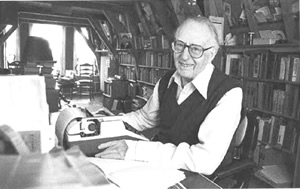
Theun de Vries (26 april 1907 – 21 januari 2005)
De Oostenrijkse dichteres en schrijfster Hertha Kräftner werd geboren op 26 april 1928 in Wenen. Zie ook alle tags voor Hertha Kräftner op dit blog.
UNTER DEM GLEICHEN MOND
sind wir traurig und einsam,
der Mann in Australien und ich.
Wenn der Mond heraufkommt,
sagt der Mann: 0 Mond,
Gewächs meiner zärtlichen Wünsche,
gepflanzt auf den Feldern
der Einsamkeit,
Planet der vergeblichen Liebe!
Warum bin ich allein
in diesen warmen Sommernächten?
Und ich sage: 0 Mond,
Gestirn der Grausamkeit und des Kalten,
Laterne der Wachenden,
die niemanden lieben!
Warum liebe ich nicht
in diesen kalten Winternächten?
Und der Mond hört uns zu,
wie wir singen und weinen,
und gleicht einer Medaille
aus billigem Gold,
wie sie die frommen Schwestern
Am Halse tragen,
wenn sie vom Wallfahren
heimkommen.
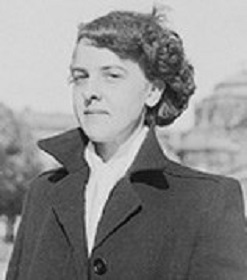
Hertha Kräftner (26 april 1928 – 13 november 1951)
De Duitse dichter, literatuurwetenschapper, jurist en politicus Johann Ludwig Uhland werd geboren in Tübingen op 26 april 1787. Zie ook alle tags voor Johann Uhland op dit blog.
Künftiger Frühling
Wohl blühet jedem Jahre
Sein Frühling, mild und licht,
Auch jener große, klare,
Getrost! er fehlt dir nicht;
Er ist dir noch beschieden
Am Ziele deiner Bahn,
Du ahnest ihn hienieden,
Und droben bricht er an.
Mailied
Wenig hab`ich noch empfunden
Von der werthen Frühlingszeit;
All die Luft und Liebigkeit
hat zu mir nicht Bahn gefunden.
Ach, was sollt`ein Herz dabei,
Das sich so zerrissen fühlet?
Jetzt empfind`ich erst den Mai,
Seit der Sturm in Blüthen wühlet.
Die Lerchen
Welch ein Schwirren, elch ein Flug?
Sei willkomennen, Lerchenzug!
Jene streift der Wiese Saum,
Diese rauschet durch den Baum.
Manche schwingt sich himmelan,
Jauchzend auf der lichten Bahn;
Eine, voll von Liebeslust,
Flattert hier in meiner Brust
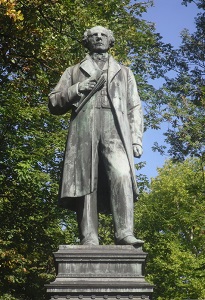
Johann Uhland (26 april 1787 – 13 november 1862)
Monument in Tübingen
Zie voor nog meer schrijvers van de 26e april ook mijn blog van 26 april 2016 en ook mijn blog van 26 april 2015 deel 1 en eveneens deel 2.
|



